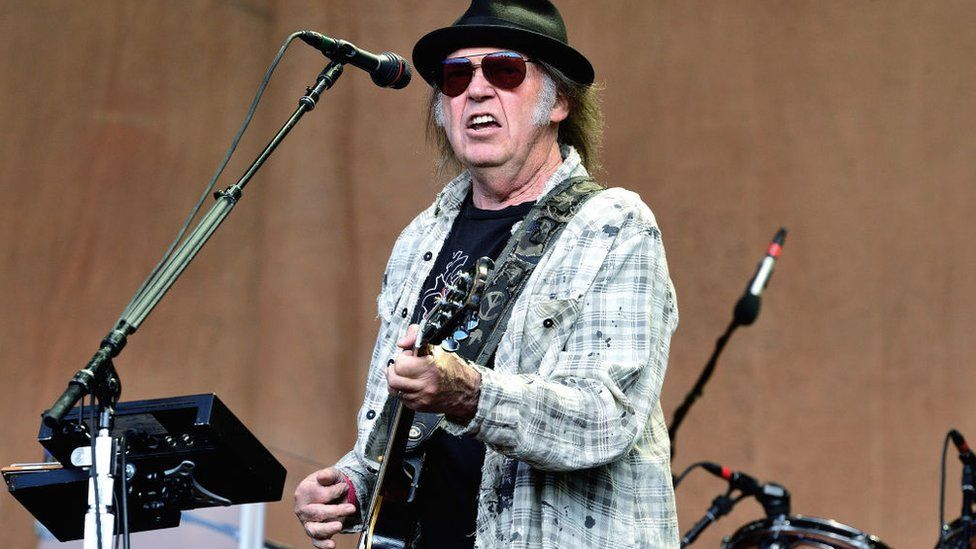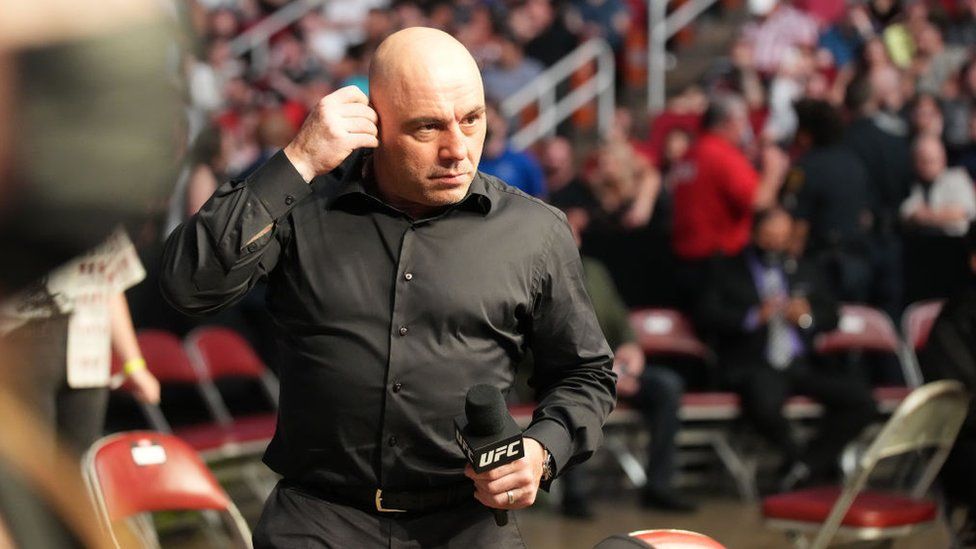
Neil Young's music is being removed from Spotify after the rock star called for the streaming platform to choose between him and podcaster Joe Rogan.
Accusing him of Covid misinformation, Young told Spotify this week: "They can have Rogan or Young. Not both."
Rogan has been criticised for interviewing an infectious disease specialist who opposes Covid-19 vaccines for children.
Spotify said it "regrets" the move and hopes he returns to the platform soon.
The Canadian-American musician behind classic rock hits such as Harvest Moon and Heart of Gold publicly accused Spotify on Monday of "spreading fake information about vaccines - potentially causing death to those who believe the disinformation being spread by them".
In another statement posted to his website on Wednesday he called the music streaming giant "the home of life-threatening Covid misinformation", adding: "Lies being sold for money."
He also thanked his record label, Warner Brothers-owned Reprise Records, for supporting his decision, saying that around 60% of all of his streamed music comes from Spotify listeners.
"Thank you Warner Brothers for standing with me and taking the hit - losing 60% of my worldwide streaming income in the name of Truth," he wrote online.
Spotify reportedly paid $100m (£75m) for rights to The Joe Rogan Experience podcast in 2020. The programme is the top podcast on Spotify, and is reportedly downloaded almost 200 million times a month.
On Wednesday, Spotify replied to the singer's ultimatum.
"We want all the world's music and audio content to be available to Spotify users. With that comes great responsibility in balancing both safety for listeners and freedom for creators," it said.
"We have detailed content policies in place and we've removed over 20,000 podcast episodes related to Covid since the start of the pandemic."
Spotify has more than 300m monthly listeners, including more than 170m who pay for a subscription to the service.
It has defended Rogan in the past, including after an episode in 2020 that featured the conspiracy theorist Alex Jones.
"We want creators to create," chief executive Daniel Ek told The Financial Times at the time. "It's what they do best. We're not looking to play a role in what they should say."
At the time of writing, no other artists have followed Young's lead.
Steve Sladkowski, the guitarist for Canadian rock band Pup, gave one explanation why, tweeting, "It rocks that Neil can take his music off [Spotify] but the fact remains that the vast majority of us can't afford to do that because the (very meagre) royalties are one of the few ways to cobble together any semblance of a living."

Young is not the first person to raise concerns over the content of Rogan's podcast.
In early January, a group of doctors, scientists and healthcare professionals signed an open letter to Spotify citing Rogan's "concerning history" in discussing the Covid-19 pandemic.
The letter referred to an episode in which Rogan interviewed Dr Robert Malone, a virologist who worked on early research into the mRNA technology behind several Covid-19 vaccines, but who is now critical of the treatments.
Fact-checkers have fiercely disputed Dr Malone's claim that vaccination puts people who have already had Covid-19 at higher risk.
He also said world leaders had hypnotised the public into supporting vaccines, drawing parallels between the pandemic and the rise of the Nazi party in 1930s Germany. Twitter banned Dr Malone, accusing him of spreading misinformation.
Last year, before that episode was recorded, Rogan clarified that he was "not an anti-vax person".
"I believe they're safe and encourage many people to take them," he said, while refusing to back down on claims that young people did not "need" the vaccine.
Rogan has also been criticised in the US for touting the anti-parasite drug ivermectin as a treatment for coronavirus.
As for Young, the singer is no stranger to serious medical issues.
He is a survivor of the polio virus, catching the infection as a child four years before a vaccine was made available in 1955.
Young described the moment he was diagnosed with polio as his "first big trauma" and recalled how other children were warned to avoid him while he recovered in quarantine.
The rock star has removed his songs from Spotify before - quitting the service, along with Apple Music and other streaming sites, in 2015 after stating their audio quality was not good enough.

Follow us on Facebook, or on Twitter @BBCNewsEnts. If you have a story suggestion email entertainment.news@bbc.co.uk.
https://ift.tt/3fZLQwb
Entertainment

No comments:
Post a Comment